Safe standing: Lib Dems make 2015 General Election pledge
- Published
Safe standing: Lib Dems propose safe standing return
The Liberal Democrats want to change the law and allow Premier League and Championship clubs to introduce safe standing at stadiums.
The party has confirmed to BBC Sport it plans to make the pledge as part of its 2015 General Election manifesto.
Currently, the Football Spectators Act 1989 requires safety authorities to ensure fans attending games in England's top two divisions are seated.
However, the party is not advocating a return to open terracing.
Jon Darch demonstrates the new stadium safe standing seat
It believes rail seats, popular in German football, should be introduced if clubs wish to install standing sections.
Rail seats can be locked in an upright position to allow fans to stand and lean against a barrier.
However, the seats can also be unlocked to comply with all-seater stadium rules, as and when required.
The Football Supporters' Federation (FSF) has led a campaign in favour of safe standing for several years.
"Football can't bury its head in the sand," said an FSF spokesman. "Tens of thousands already stand at games.
"Clubs who back rail seats are simply listening to their fans and responding to safety needs.
"Germany has had rail seats for many years and they have had no problems. The Government tells us it needs robust proof, so let's have a trial and see."
Several Premier League clubs - including Aston Villa, Burnley, Crystal Palace, Sunderland and Swansea City - now back the introduction of rail seats on a trial basis.
The Football League has also lobbied for a change in legislation given a number of its 72 clubs would like to implement standing.
Who uses rail seats? |
|---|
They are used at grounds in countries like Austria, Germany and Sweden. |
A number of teams in Germany's Bundesliga use them, including Bayer Leverkusen, Borussia Dortmund, Hamburg and Werder Bremen. |
They can be unlocked or locked to create a standing or seated area. In Germany, seats are used for European matches but not league games. |
Chief executive Shaun Harvey said: "Since being given a mandate by our clubs to lobby for a change to the law on the use of standing accommodation, we have had useful discussions with the Sports Minister and other relevant stakeholders on this matter.
"We recognise that this is an extremely emotive issue and that significant change isn't necessarily going to happen overnight.
"However, a logical first step would be for safe standing products, such as rail seating, to be licensed for use by the relevant authorities.
"This would enable one of the 21 Football League clubs that is not currently required by law to have an all-seater stadium to install a pilot scheme at its ground.
Fans want safe standing - Fry
"This would give everybody greater insight into the use of this type of accommodation and help take the debate forward in a cautious and responsible manner."
However, the Premier League has reiterated its opposition, telling BBC Sport: "It remains the Premier League's position that stadiums should be all-seat, in line with government policy, and we will not be encouraging the government to change the law."
Liberal Democrat spokesperson John Leech MP believes the evidence to allow standing is overwhelming.
"Safe standing is allowed in many other sports and we do not believe that the top level of football should be an exception," he said.
"We are not calling for a return of the terraces of the 1980s. Modern safe standing areas using rail seating operate very successfully in top-tier football across Europe."
With the Liberal Democrats struggling in the polls, an outright victory for the party in next year's election may seem unlikely.
However, the formation of another coalition government could see safe standing feature in any negotiations between the parties over a combined legislative agenda.
Following the recommendations of Lord Justice Taylor's report into the Hillsborough disaster in 1989, in which 96 Liverpool fans lost their lives, clubs in the top two tiers of English football have been required to provide every spectator with a seat.
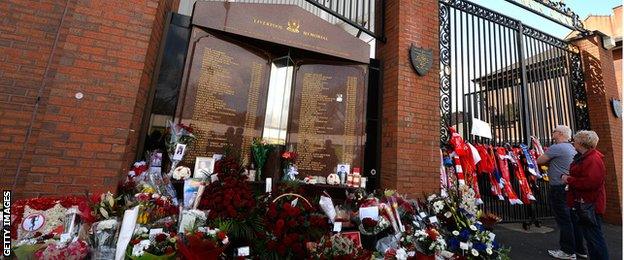
The memorial at Anfield serves as a constant reminder of the Hillsborough disaster
The Liberal Democrat pledge promises to amend the law to allow safety authorities in England and Wales to issue guidance to clubs on how safe standing could be introduced.
The FSF also claims safe standing would make it cheaper for fans to watch games.
"Standing areas in safety-conscious nations such as Germany are traditionally far cheaper, with season tickets available for a fraction of the cost at equivalent-sized clubs in the UK," added the spokesman.
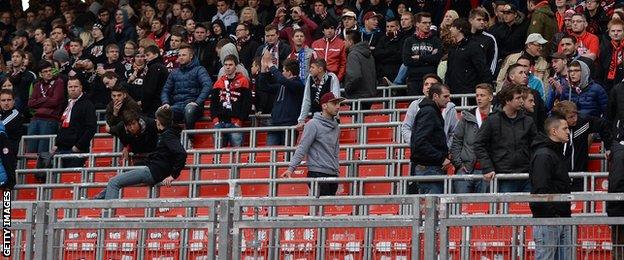
Hannover's stadium has safe standing areas, allowing an extra 2,700 unseated fans to watch the match
Leech agrees, adding: "Safe standing offers supporters more choice, a better atmosphere and cheaper tickets. It is an idea whose time has come and I am proud that it is the Liberal Democrats who are the first political party to commit to delivering this."
Earlier this year, Bristol City installed a small section of rail seats at their Ashton Gate stadium.
However, they are only able to utilise them during Bristol Rugby games which also take place at the ground.
Bristol City trial safe standing area
Scottish Premiership clubs are also strong backers of safe standing.
However, Celtic's application to install a section of rail seating was rejected by Glasgow City Council earlier this month.
The council claimed Celtic's plan did not offer enough assurances to its safety advice group, which included representatives from the emergency services.
In Wales, Assembly members recently voted 26-1 to support the introduction of safe standing, believing that football should be no different from rugby or other sports.
However, as the laws relating to standing are not devolved, any change in Wales would require Westminster MPs to vote in favour of reform.
Strong opposition to standing does remain, with the Association of Chief Police Officers saying previously that they would need to be convinced over whether it could work within some of England's largest stadiums.
The Hillsborough Families Support Group have also steadfastly maintained their position against any return of standing.
- Published14 December 2013
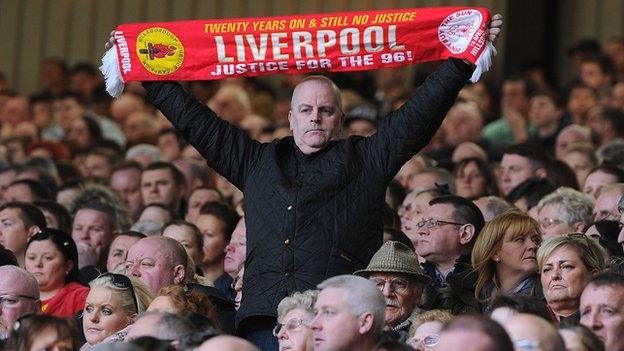
- Published11 June 2014
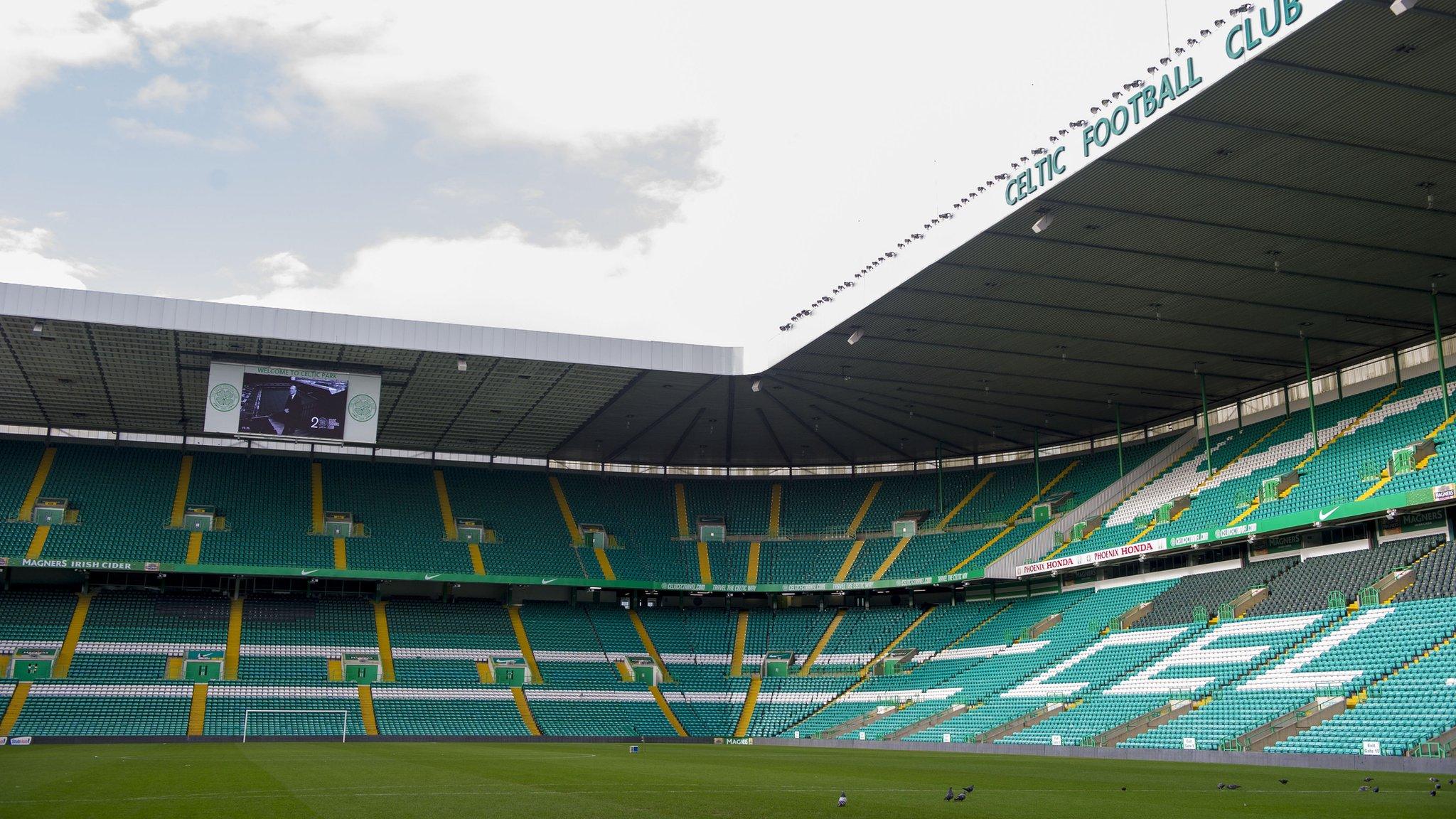
- Published28 February 2014
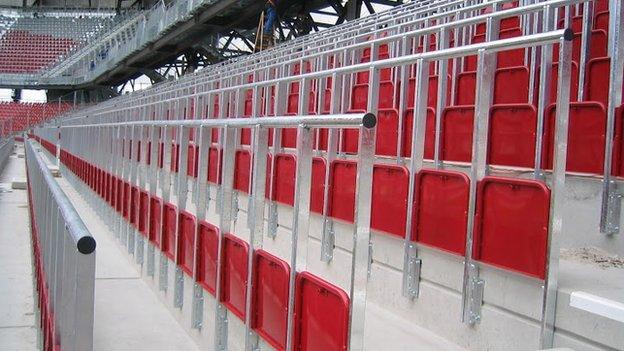
- Published12 February 2014
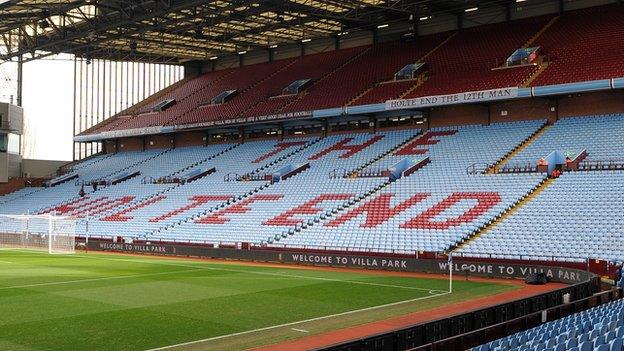
- Published7 June 2019
